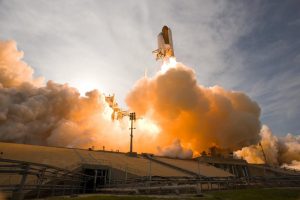Space exploration and discovery efforts have had moments of thriving collaboration and others of competition. Collaboration and competition have been mostly based on nations more than disciplines. When it comes to disciplines, collaboration seems to have been relatively narrow; space being handled by a few highly specialized fields. It seems that we are approaching a moment when more collaboration between disciplines and setting common goals between countries is going to be needed.
 There has been a progressive increase over the years of satellites orbiting the Earth. More than progressive, it seems exponential, for example, SpaceX already has 1,584 operating satellites, and it wants to get to 40,000 in a few years. Multiply this by several companies and countries, and all of the sudden the orbit around our planet seems small.
There has been a progressive increase over the years of satellites orbiting the Earth. More than progressive, it seems exponential, for example, SpaceX already has 1,584 operating satellites, and it wants to get to 40,000 in a few years. Multiply this by several companies and countries, and all of the sudden the orbit around our planet seems small.
A larger amount of satellites helps to keep people all over the world connected. But their presence comes at a cost for astronomy and related fields (e.g., astrobiology). Their light makes the use of telescopes harder. Furthermore, their presence takes up space and creates “traffic”. Also, once they stop being used or are defective, they fly around as “space junk”, and satellites as a whole or their parts can represent a collision risk for other objects in space. Even working satellites represent a collision risk.
This all points to the need for countries to come together to set common goals and rules. Space exploration and satellite presence are wanted and needed. This also points to the need for a diverse array of stakeholders and disciplines to come together to dialogue to find synergies. How can both space exploration and network development thrive? And to which extent do we want each of these areas to develop?
There is no overarching authority to guide the dialogue regarding space. The Economist wrote a piece about this issue some days ago, providing an interesting blueprint for policies that could support a win-win scenario for these stakeholders, which are currently holding diametrically opposing needs and goals.
By Olga Muñoz, Graduate Assistant
 0
0
